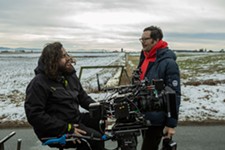Nurture vs. Bloody Nature
The costs of being yourself in Wildling at SXSW
By Richard Whittaker, 4:00PM, Mon. Mar. 12, 2018
To modern eyes, “Little Red Riding Hood” is a metaphor for burgeoning sexuality, but when it was first told in the thick, shadow-cloaked forests of Central Europe, the wolf at the door was very real. Sometimes a wolf is just a wolf, and that’s a sharp-fanged truth of Wildling. Yet that does not mean there should be no empathy for the monster.
“We don’t necessarily respect the others,” writer/director Fritz Böhm said. “Whether they’re other people, whether they’re wild animals, we tend to be suspicious toward everything that is different, and sometimes we become very brutal about it.”
Böhm’s attraction to the beast in the dark began in childhood. “It came from my mom reading so many fairy tales to me as a kid,” he said. “I just always found myself drawn to the bad guys, Rumpelstiltskin or the Snow Queen, because their stories were so much more heartbreaking than that of the actual heroes.”
The monster in Wildling is Anna (English actress Bel Powley), raised in total isolation by the mysterious Daddy (horror icon Brad Dourif). Inevitably, the world, and Anna’s true lycanthropic nature, cannot be kept at bay. Yet Anna is not the typical teen wolf. Böhm said, “I wanted to keep away from all the typical tropes, like magical amulets and full moon transformations and silver bullets, so more and more I started to create my own mythology around this.”
That’s why he looked away from the stalwarts of the werewolf canon – The Wolf Man, An American Werewolf in London, Ginger Snaps – and instead at less conventional stories of otherness. “In these movies, there is something truly irreversible about the transformation that happens. Like the girl in Let the Right One In, she can’t choose to be human. She is a vampire, and there is no way back. In Black Swan, there’s something irreversible about that transformation. It’s not like Natalie Portman only become the black swan at night. She’s gradually, slowly transforming, and there’s no way back.”
Böhm is not the first filmmaker to link monstrous transfiguration to puberty – both are about the body in rebellion. However, this is a reversal of the trope of lycanthropy as a metaphor for adolescence. Instead, Böhm saw the universality of that teen transformation as empathetically connecting audiences with Anna’s plight. “You can’t go through puberty, and decide to reverse it,” he said. “There’s a biological force behind it.”
Yet while puberty is how audiences can empathize with Anna’s changes, for Böhm it’s also an insight into those others. “I’m a huge animal lover,” he said, “and I always thought of what happens with wolves in the wild, how they get pushed back by civilization, and their numbers dwindle because us Homo sapiens like to build cities and roads everywhere, and their habitat gets smaller and smaller.”
Böhm has gone through a major life change of his own. The German-born director had established a successful career as a producer and production manager in his homeland, before moving to the U.S. in 2013. Oddly, he had been stymied in the land of the Brothers Grimm in his attempts to make a horror-tinged drama. “It’s not like I didn’t try to get my directorial debut done in Germany,” he said, “But I found it very hard to get a project off the ground in the German market that had fantasy aspects to it.”
There are genre films being made there, like 2008’s Krabat and the Legend of the Satanic Mill, on which Böhm served as post-production supervisor (“My first paid gig,” he said proudly), “but most of the movies that my colleagues over there make are either comedies or really realistic social dramas, because those are the popular genres in Germany. So you come to the potential financier with the idea of a girl who transforms into a creature, and they’re like, ‘Uh, we don’t know, that seems pretty far out there.’”
By comparison, Böhm said, “When I came to the U.S., I found there was much greater openness to these kind of stories.” Even he’s not sure why. “Maybe it’s just that it’s a younger culture, and movies and fantasy are such a huge part of it.”
Wildling
Narrative Spotlight, World Premiere
Monday, March 12, 9:30pm, Stateside Theatre
Thursday, March 15, 12:30pm, Paramount
A note to readers: Bold and uncensored, The Austin Chronicle has been Austin’s independent news source for over 40 years, expressing the community’s political and environmental concerns and supporting its active cultural scene. Now more than ever, we need your support to continue supplying Austin with independent, free press. If real news is important to you, please consider making a donation of $5, $10 or whatever you can afford, to help keep our journalism on stands.
Carys Anderson, June 28, 2024
Richard Whittaker, May 8, 2024
July 12, 2024
July 12, 2024
SXSW, SXSW Film 2018, Wildling











